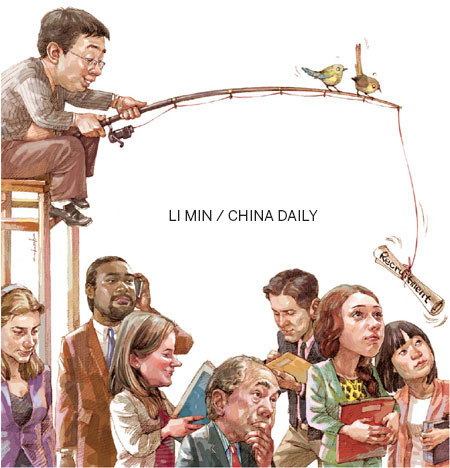Talent scouts must find, and also keep
Updated: 2013-04-26 08:33
By Chen Yingqun and Hu Haiyan (China Daily)
|
|||||||||||

|
Foreigners at a recent job fair in Nanjing, Jiangsu province. Provided to China Daily |
When the clock strikes midnight on April 30 and China starts celebrating International Workers' Day, it is also the deadline for entries in a talent contest in which the country tries to draw the world's brightest minds to work in its offices, universities and laboratories.
Thousands of applications that have poured in from around the world for the 1,000 Talents Plan will be scrutinized over the next few months, as China embarks on yet another program to attract more overseas talent to its shores.
What exactly drives the world's second-largest economy on such a massive search for talent? The answer lies partly in the recent rapid outbound moves by Chinese companies and the government push to shape China's growth on a knowledge-driven economy.
Through its far-reaching human resources policies over the last decade, the government has made clear its intention to lead the hunt for global talent. Local governments have not been far behind and have been competing with each other in the talent stakes.
North China's Tianjin municipality announced its recruitment plan for international talent in late March, with about 125 key universities, research institutions and enterprises offering 1,326 positions for top talent, compared with just 760 positions last year.
About 46 percent of the positions are at or above the level of associate professor and vice-chairman of companies, the Tianjin Municipal Human Resources and Social Security Bureau says.
Zhenjiang city in East China's Jiangsu province has implemented 20 favorable policies for the first time to help attract 200 foreign experts and 700 high-level talents with an overseas background in the next three years.
Shandong province has drawn up plans to establish another 10 recruitment liaison offices overseas, including in the US and Germany, to expand its channels for the recruitment of overseas talent.
The Donghu New and High Technology Development Zone of Wuhan city in Hubei province recently said it would offer incentives to those who successfully recommend high-level international talent to the zone, the highest reward being 240,000 yuan ($38,800; 29,700 euros).
Rapid growth
"China's hardware facilities like its infrastructure are in reasonably good shape after 30 years of solid growth," says Wang Huiyao, director of the Center for China and Globalization, which has focused on overseas talent studies for more than a decade. "However, it still lacks in software skills like managerial and scientific expertise. One major reason for the weakness is the lack of personnel with such know-how."
Wang says that Chinese companies looking to spread their wings in overseas markets or participate in international bidding projects are in strong need of international talent.
After the 2008 global recession, international talent has also set its sights on China. Spanish PhD student Mario Lanza is one of them. His aim is to find a permanent position at a Chinese university working in nanotechnology.
"China has offered good money and resources to attract talent from abroad, and indeed creates a very good environment for professionals like me to come and stay. Also in my case, I can also have access to some tools which young researchers don't have in our home countries," he says.
Fu Junsheng, division chief of the Information Research Center of International Talent under the State Administration of Foreign Experts Affairs, says: "Currently China's international talent attraction programs are led by central and local governments. Most of the top talent search programs are geared toward industries such as aerospace, new energy, bio-pharmaceuticals, life sciences and other high-tech industries."
|
||||
In 2011, it launched the Recruitment Program of Foreign Experts, and plans to invite 500 to 1,000 high-end non-Chinese foreign professionals from other countries over the next decade.
Provinces, municipalities and autonomous regions have also started their own plans to introduce overseas professionals, such as Shenzhen's Peacock Program.
Overseas professionals recruited by the programs will be entitled to financial subsidies and favorable visa, taxation and wage, residence, medical care and insurance policies. For example, the Recruitment Program of Global Experts awards each foreign professional a subsidy of up to 1 million yuan from the central government, while scientific researchers can get a 3 million to 5 million yuan research allowance.
Moreover, governments have also offered favorable policies to encourage overseas Chinese to start businesses in China, which has also sparked a surge in overseas Chinese coming back.
The government is also considering a special visa for attracting talent and more steps to liberalize its issuing of permanent residency visas. It has also begun to induct foreigners into China's social security system, and now has more than 120,000 foreigners on its rolls.
The nation's 1,000 Talents Plan has attracted more than 3,300 experts, even as tens of thousands of highly skilled people have been drawn to the country in other ways. China has also set up 112 international talent recruitment bases and more than 260 business start-up centers for Chinese returning from overseas, the latter drawing 40,000 people, Xinhua News Agency reported recently.
Related Stories
Many magnets for thousands of skills 2013-04-26 08:33
Secrets of the headhunters 2013-04-26 08:33
The challenges of coming home 2013-04-26 08:33
It takes a smart firm to keep smart people 2013-04-26 08:33
Today's Top News
List of approved GM food clarified
ID checks for express deliveries in Guangdong
Govt to expand elderly care
University asks freshmen to sign suicide disclaimer
Tibet gears up for new climbing season
Media asked to promote Sino-Indian ties
Shots fired at Washington Navy Yard
Minimum growth rate set at 7%
Hot Topics
Lunar probe , China growth forecasts, Emission rules get tougher, China seen through 'colored lens', International board,
Editor's Picks

|

|

|

|

|

|










